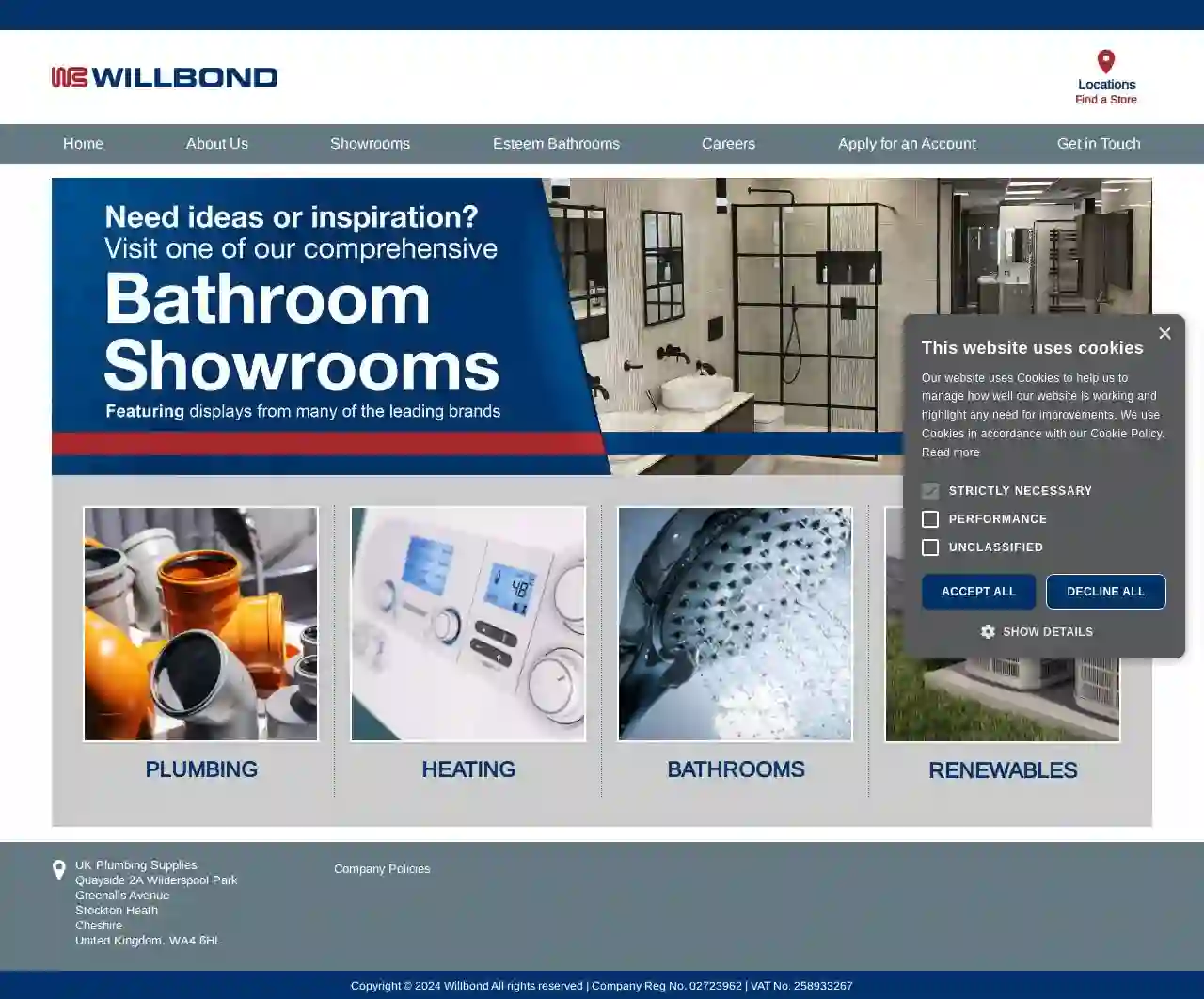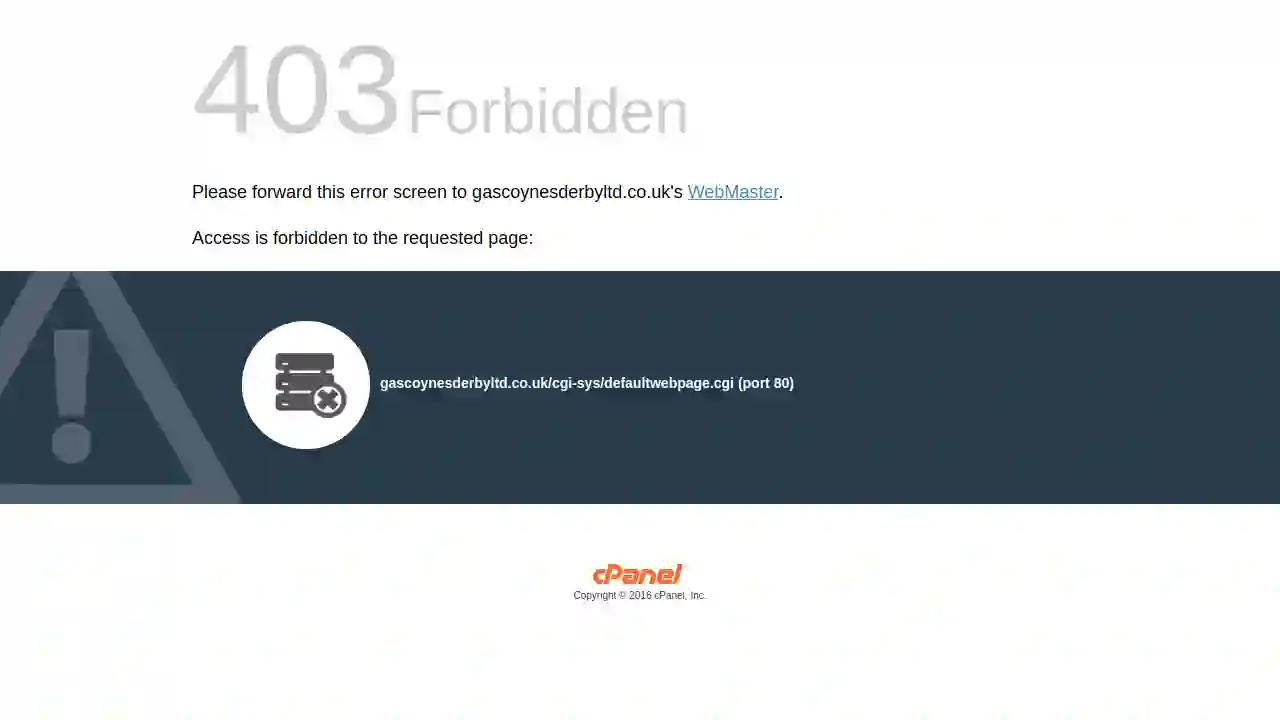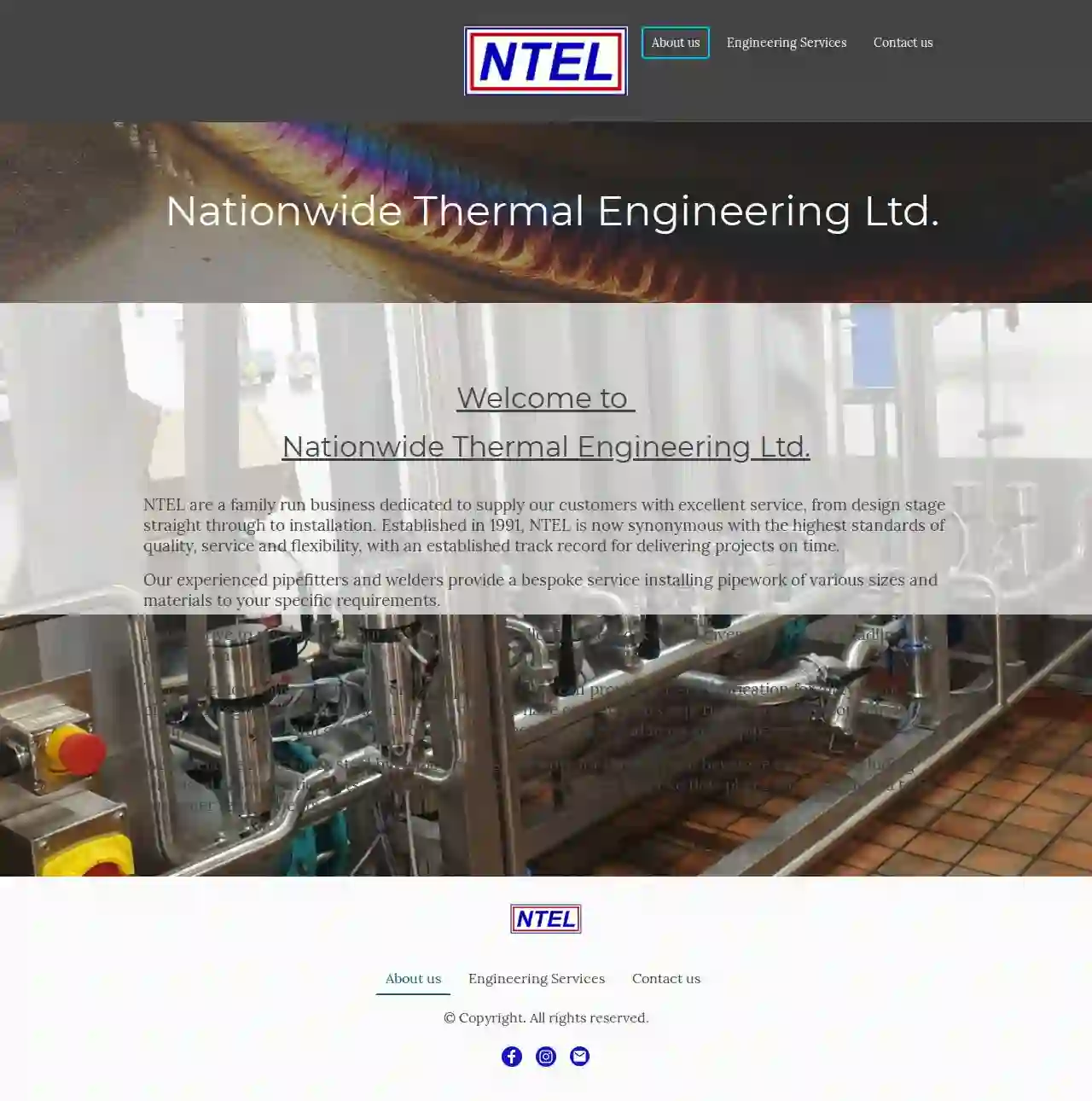HVAC Companies West Hallam
Best HVAC Services in West Hallam
Receive multiple Heating and Cooling Services quotes for your project today! Compare profiles, reviews, accreditations, portfolio, etc... and choose the best service.

Willbond Plumbing Centres - Ilkeston
4.712 reviewsQuayside 2A Wilderspool Park, Greenalls Avenue, Stockton Heath, WA4 6HL, GBWe operate under a highly decentralised business model, allowing our experienced local teams to be the primary decision makers for our customers. Such a structure ensures that individual customer requirements are met with a first-class service. Our national infrastructure supports these efforts, enabling us to provide a consistent service throughout the UK.We are committed to maintaining extensive stock local to the customer's needs enabling us to offer the UK’s top brands ready for same-day delivery or collection. Our inventory also boasts a vast range of boiler spares, provided through our own central distribution, guaranteeing next-day availability for over 20,000 items.Whether you are a small or large customer, our aim is to provide you with the very best of service and ensure you come back time and time again.With over a century of expertise we are very proud of our history. Since we first opened our doors in 1896, exceptional customer service and expertise are the key to our continued success.We’ve built a reputation as a specialist merchant of plumbing, heating and bathroom products for the trade and retail. We are proud to be an independent company with a passion for what we do. Our locations can be found right across the East Midlands. See the location finder above for your nearest one.
- Services
- Why Us?
- Gallery
Get Quote
GDL Air Systems Limited
51 reviewsHadfield, Glossop, Woolley Bridge Road, SK13 2NR, GBGDL Air Systems is a privately owned manufacturer and supplier of a large range of louvre systems, air diffusers, grilles, natural ventilation systems, brise soleil and dampers. GDL has serviced the built environment industry for more than 3 decades; working with designers, architects and contractors across the UK and overseas. GDL offers a vast wealth of experience in technical, manufacturing and product development fields, ensuring our customers are supplied with the choice of products most suited to their requirements. Our comprehensive regional sales representation across the UK and Ireland offers a wealth of expertise and knowledge across our entire product range. A way to find, select and specify GDL construction products for your next project.
- Services
- Why Us?
- Gallery
Get Quote
Gascoynes Derby Ltd
54 reviews123 Derby Road, Derby, DE1 2AA, GBGascoyne's Derby Ltd is a family-run business with over 30 years of experience in the industry. Our mission is to provide high-quality, bespoke furniture making services to our customers. We take pride in our attention to detail and commitment to delivering exceptional results. Our team of skilled craftsmen work closely with our clients to understand their needs and preferences, ensuring that every piece of furniture is tailored to their unique requirements.
- Services
- Why Us?
- Accreditations
- Our Team
- Testimonials
Get Quote
Mark of a good tradesman
4.710 reviews54 Amersham Way, Measham, DE12 7PD, GBWe are a family run business and worked as Corgi and Gas Safe regsitered engineers for over 11 years. This has helped us gain extensive knowledge in this field. All work is carried out to the highest standard with customer satisfaction being the main objective. We offer a full gas service including landlord certificates, breakdown support and servicing for boilers and gas appliances. Our services include plumbing and complete property maintenance. Based in Nuneaton, we also cover Tamworth and the surrounding areas.
- Services
- Why Us?
- Accreditations
- Our Team
- Testimonials
- Gallery
Get Quote
Willetts Plumbing & Heating Ltd. WPH
54 reviewsIlkeston, GBWelcome to Willets Plumbing & Heating Services. We provide an experienced, reliable, qualified and insured service to commercial & domestic customers. We can provide our Gas Services to domestic and also commercial premises. Heaters, Appliances, Boilers, Testing, Purging and More.Heating specialists for your home or business. Repairs, Breakdowns and system maintenance provided by a qualified heating engineer From broken toilets to full plumbing system requirements to bathroom installation. Experienced, Qualified & Highest Quality Emergency call outs, planned regular maintenance, landlords to offices, gyms, schools, Leisure centres and more.
- Services
- Why Us?
- Our Team
- Testimonials
- Gallery
Get Quote
Ellis Andrew plumbing & Heating
53 reviewsIlkeston, 98 Godfrey Drive, DE74HN, GBWelcome to Ellis Andrew Plumbing & Heating, high quality and reliable plumbing and heating specialists in Derbyshire. A friendly and reliable team who work hard to maintain our reputation as one of Derbyshire's most trustworthy plumbing and heating companies. We provide a comprehensive range of high quality and reliable plumbing and heating services throughout Derbyshire and the surrounding areas. For many years we have been helping the people of Derbyshire with their plumbing and heating needs and during this time we have developed an unrivalled reputation for our honest, hard-working work ethic. We specialise in a wide range of plumbing and heating services, including central heating, kitchens and bathrooms, boiler installations and repairs and much more. We pride ourselves on offering a hassle free and affordable service where the customer needs always take priority, as do excellent quality workmanship and operating to modern standards. As a company we are confident that we can meet all your requirements on your next plumbing and heating project and also exceed your expectations when it comes to quality and affordable plumbing and heating specialists in Derbyshire. All of our team are highly skilled in the plumbing and heating trade and have built up a wealth of experience over the last several years, so no job is too demanding for us as we have all been trained to deal with every situation that the plumbing and heating trade can offer.
- Services
- Why Us?
- Testimonials
- Gallery
Get Quote
Nationwide Thermal Engineering Limited
51 reviewsEtherow Industrial Estate, Wooley Bridge Road, Unit 7, Hadfield, SK13 2NS, GBNationwide Thermal Engineering Ltd. is a family-run business dedicated to providing excellent service to its customers, from the design stage through to installation. Established in 1991, NTEL is now synonymous with the highest standards of quality, service, and flexibility, boasting a proven track record of delivering projects on time. Our experienced pipefitters and welders offer a bespoke service, installing pipework of various sizes and materials to meet your specific requirements. We prioritize our customers, and our flexible approach allows us to work to any given schedule or deadline. To minimize downtime and disruption to site operations, we can provide off-site fabrication for all types of pipework, regardless of material or application. With over 20 years of experience, we specialize in steam/condensate, compressed air, natural gas, hygienic food-grade, potable water, and many other pipework systems. We particularly excel in stainless steel hygienic process pipework for the food and beverage industry, including packaged pasteurisation sets, pumping and filter skid packages, and bespoke flow plates, all tailored to customer needs.
- Services
- Why Us?
- Gallery
Get Quote
TitanFlameltd-Glossop
51 reviews175 High St W, Glossop, SK13 8HJ, GBTitan Flameltd is a local plumbing emergency call out service with over 20 years of experience in plumbing and heating. We strive to complete every job with the highest skill and best customer service. Our team of emergency plumbers and heating engineers are available 24/7 to provide fast, reliable solutions. We offer a range of services including appliance installation, bathroom plumbing, emergency plumbing, immersion heaters, kitchen plumbing, outdoor plumbing, tap repair and install, pipe repair, boiler installation and repair, water heater installation and repair, radiator installation and repair, gas line installation and repair, furnace installation and repair, heat pump installation and repair, drain cleaning, plumbing repairs, pipe installation and repair, water treatment, and sewer line repair and replacement. We are available 24/7 and offer quick appointments, fast, efficient services, and expert support when you need it most.
- Services
- Why Us?
- Gallery
Get Quote
GasCare
4.9539 reviewsGlossop, GBGasCare is a trusted partner for all your home heating needs. We offer a range of services, including boiler installation, repair, servicing, and smart heating solutions. Our team of experienced engineers is dedicated to providing prompt and reliable service, ensuring your home is warm and comfortable year-round. We understand that a faulty boiler can be a major inconvenience, which is why we offer 24-hour emergency call-out services. We also provide free energy audits to help you save money on your energy bills. At GasCare, we're committed to making your life easier when it comes to heating your home.
- Services
- Why Us?
- Gallery
Get Quote
Gasfituk
4.34 reviews128 Nottingham Road, Nottingham, NE10 2EN, GBWelcome to Gasfituk, a Local firm offering gas, plumbing and heating services trading on a good reputation throughout the Nottingham and Derby Area. We take great pride in our ability to offer you a wide range of different services being competitively priced and providing a clean, reliable, fast and efficient service. We are specialists in gas, plumbing and heating, and our highly trained and experienced gas safe engineers specialise in the service, repair and installation of all gas appliances.
- Services
- Why Us?
- Gallery
Get Quote
Over 12,692+ HVAC Companies on our directory
Our HVAC companies operate in West Hallam & surroundings!
HVACCompaniesHub has curated and vetted the Best HVAC Companies near West Hallam. Find a top & reliable pro today.
Frequently Asked Questions About HVAC Companies
- Age: Furnaces typically last 15-20 years. If yours is significantly older, replacement is usually the better long-term choice.
- Frequency and Cost of Repairs: If you've been having repeated repairs, replacing the furnace might be more cost-effective in the long run.
- Energy Efficiency: Newer furnaces are significantly more energy-efficient, which can lead to lower energy bills.
- Safety Concerns: Older furnaces can pose safety risks, such as carbon monoxide leaks. A new furnace offers enhanced safety features.
- Split Systems: The most common type, consisting of an outdoor unit (condenser/compressor) and an indoor unit (air handler/furnace).
- Heat Pumps: Provide both heating and cooling by transferring heat between indoor and outdoor air.
- Ductless Mini-Splits: Ideal for homes without existing ductwork or for adding heating and cooling to specific zones.
- Packaged Units: A single unit that contains all the system's components.
- Geothermal Heat Pumps: Use the earth's stable temperature to provide highly efficient heating and cooling.
- Regular Maintenance: Schedule annual HVAC maintenance to ensure your system is running at peak efficiency.
- Programmable Thermostat: Use a programmable or smart thermostat to optimize temperature settings based on your schedule.
- Seal Air Leaks: Caulk and weatherstrip windows and doors to prevent drafts.
- Proper Insulation: Ensure adequate insulation in your attic, walls, and floors to prevent heat loss in winter and heat gain in summer.
- Ventilation: Use fans strategically to circulate air and reduce reliance on AC.
- Energy-Efficient Appliances: Choose energy-efficient appliances to reduce your overall energy load.
- HVAC Zoning: Consider zoning your HVAC system to condition different areas of your home separately.
Should I repair or replace my old furnace?
What are the benefits of a programmable thermostat?
What are the different types of HVAC systems?
How can I reduce my HVAC energy consumption?
Should I repair or replace my old furnace?
- Age: Furnaces typically last 15-20 years. If yours is significantly older, replacement is usually the better overall choice.
- Frequency and Cost of Repairs: If you've been having repeated repairs, replacing the furnace might be more cost-effective in the long run.
- Energy Efficiency: Newer furnaces are significantly more energy-efficient, which can lead to lower energy bills.
- Safety Concerns: Older furnaces can pose safety risks, such as carbon monoxide leaks. A new furnace offers enhanced safety features.
What are the benefits of a programmable thermostat?
What are the different types of HVAC systems?
- Split Systems: The most common type, consisting of an outdoor unit (condenser/compressor) and an indoor unit (air handler/furnace).
- Heat Pumps: Provide both heating and cooling by transferring heat between indoor and outdoor air.
- Ductless Mini-Splits: Ideal for homes without existing ductwork or for adding heating and cooling to specific zones.
- Packaged Units: A single unit that contains all the system's components.
- Geothermal Heat Pumps: Use the earth's stable temperature to provide highly efficient heating and cooling.
How can I reduce my HVAC energy consumption?
- Regular Maintenance: Schedule annual HVAC maintenance to ensure your system is running at peak efficiency.
- Programmable Thermostat: Use a programmable or smart thermostat to optimize temperature settings based on your schedule.
- Seal Air Leaks: Caulk and weatherstrip windows and doors to prevent drafts.
- Proper Insulation: Ensure adequate insulation in your attic, walls, and floors to prevent heat loss in winter and heat gain in summer.
- Ventilation: Use fans strategically to circulate air and reduce reliance on AC.
- Energy-Efficient Appliances: Choose energy-efficient appliances to reduce your overall energy load.
- HVAC Zoning: Consider zoning your HVAC system to condition different areas of your home separately.